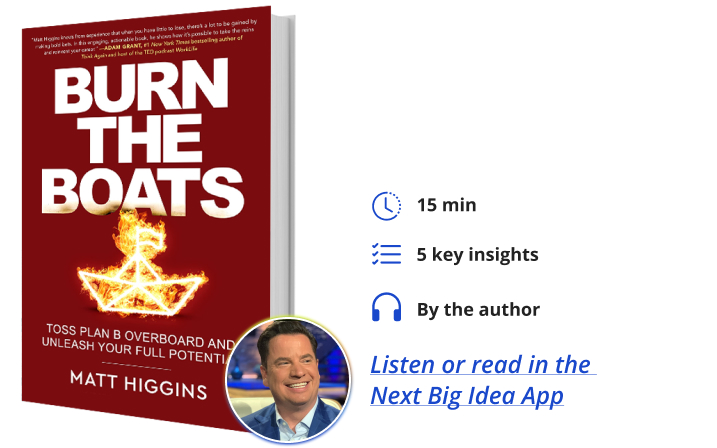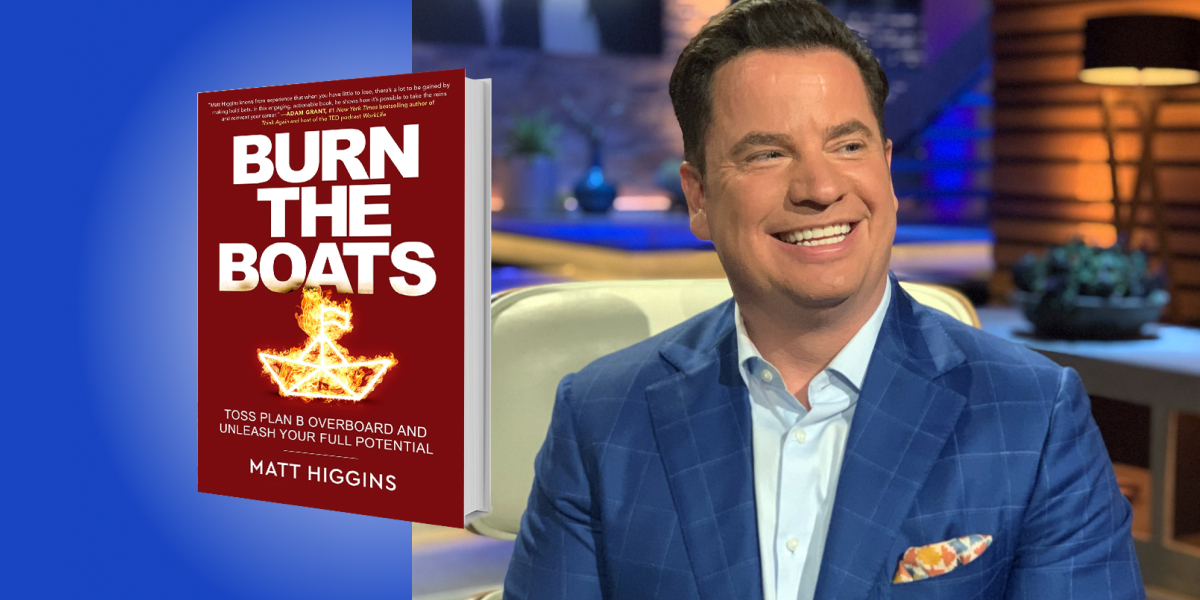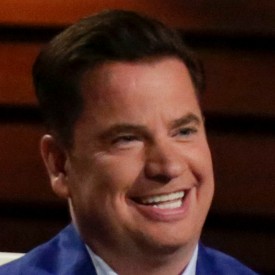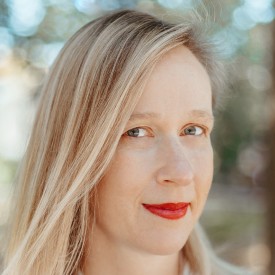Matt Higgins is an executive fellow and teacher at Harvard Business School where he teaches the course “Moving Beyond Direct to Consumer.” He is co-founder and CEO of RSE Ventures, an investment firm that focuses on consumer brands like Magnolia Bakery and Milk Bar.
Below, Matt shares 5 key insights from his new book, Burn the Boats: Toss Plan B Overboard and Unleash Your Full Potential. Listen to the audio version—read by Matt himself—in the Next Big Idea App.

1. Humans perform better without a safety net.
The idea of “burn the boats” has come up throughout recorded history. You can go back to Sun Tzu in The Art of War, Julius Caesar, the Ancient Israelites, or Cortes in 1519. No matter what language or culture, there’s always a fable around a military leader who found themselves outnumbered a hundred to one. On the precipice of losing everything, they make one critical move: literally burn their boats, eliminate any possibility of retreat, or as Sun Tzu would say, “Destroy the cooking pots and eliminate any hankering after home.”
So why is it that military strategists intuitively understand something that most of us reject? When you have a backup plan or an alternative way to achieve your dreams, you’re much less likely to do so. After surveying the literature and science, and interviewing 50 celebrities, CEOs, founders, athletes, and entrepreneurs, I found that there was always a moment when they had to decide to go all in to achieve their full potential.
There was a study in 2014 at Wharton where they tried assessing the impact of merely contemplating plan B. They had two sets of students. One group was allowed to think about an alternative way to get what they wanted and complete the assignment. Not only were the students who contemplated an alternative to achieve the result much less likely to be successful, but they were also much less interested. This idea of burn the boats that worked so well for an outnumbered army in the year 700 turns out to work quite well in peacetime, too.
2. The single greatest source of arbitrage (in life or business) is self-awareness.
Self-awareness can be cultivated. The Italians have an amazing phrase, The fish rots from the head. Metaphorically speaking, this means that in any organization, whatever dysfunction is being perpetuated can usually be traced back to the leadership. Whatever is wrong at the top cascades downstream and shows up at every level of the organization. The same could be said for human beings. When our body is struggling with ailments, a lot of times it’s because we are not in a good place mentally.
“If you want breakout success and to get unstuck, the place to start is cultivating self-awareness.”
In seeking success, we tend to seek a mentor. We go on the internet and watch TED Talks or go buy a book, but we bypass the most important, obvious step, which is to audit how we approach problems. If you want breakout success and to get unstuck, the place to start is cultivating self-awareness. When I interacted with CEOs and leaders, I found that they usually don’t put enough energy towards self-awareness, usually because of some unreconciled vulnerability that makes them afraid to look within. Therefore, they direct all their energy externally and avoid scrutiny. But without scrutiny, without curiosity about one’s own fallibility, you can’t have breakthrough success. So the first step is shedding shame. Look at any baggage you’re carrying that makes you feel ugly or ashamed, and attack it.
A lot of these issues stem from childhood. It’s why the cover of my book is a paper boat because those are the first metaphorical boats that we need to burn. The number one impediment to cultivating self-awareness is unreconciled sources of shame, vulnerability, and insecurity. The way to address them within yourself and within an organization is to model the act of shedding shame by being open and transparent about those vulnerabilities.
3. To launch a business, you need a proprietary insight, all your own.
Think about some of the greatest companies built over the last 30 years, companies like Airbnb or Uber, and ask yourself, what was the invention? You won’t find any. What you will find though is a proprietary insight.
A proprietary insight is an insight all your own that you glean from sitting in the stream of data, from personal experience, from something that only you see and have the courage to act on. Think about Airbnb and Brian Chesky, one of the founders. His insight when he was sleeping on a futon in his friend’s house was that maybe other people would want to rent out a room in a home rather than a hotel room, or rent an entire apartment. That little insight ended up creating a $100 billion company.
All of us, I argue, have proprietary insights that pass through our hands every single day by virtue of the jobs we do, the neighborhood we live in, or the family we’re born into—we see things about the world that could be done better if only someone would create that business. The bar for taking action should be lowered if you want to create a business. We are blinded sometimes by watching Shark Tank, which we all love, but in some respects perpetuates the myth that every business is founded upon an invention.
“All of us have proprietary insights that pass through our hands every single day.”
The reality is that the vast majority of businesses were born upon an insight. And when you look at the founder’s journey, you’ll always be able to identify the intersection between their lived experience and that proprietary insight. Lots of other people would probably have been able to identify that same thing, but what makes someone a founder is the courage and conviction to bring that proprietary insight to life.
4. If you want to change the world, make a gut sandwich.
When I interact with entrepreneurs, the journey usually goes something like this: They have an epiphany at 3:00 AM that they just can’t stop thinking about, and when they wake up in the morning, they reach out to the people in their circle. These are the people I call agenda-less supporters. They are pragmatic optimists. They have your best interest at heart because they love you. They are also wired to believe both anything is possible and that you can do anything—but they’re not delusional. That’s the first attempt to seek qualitative affirmation for the seed of an idea.
The second step is a sliding doors moment for most entrepreneurs. That’s where data comes in. They’ll seek any amount of data to support whether there’s a product market for it, meaning if there are enough people willing to pay enough money to make it worth spending five years bringing this idea to life.
The challenge is that the degree to which an idea is truly revolutionary has an inverse relationship with the amount of data that will be able to support it. Opportunity arrives before the tipping point of evidence. If an idea is truly game-changing, there’s not going to be much data out there to support it. If there were, there’d be a hundred people pursuing the same thing.
When looking back to reconstruct groundbreaking ideas, like the iPod, we tend to construct the data in reverse. We rearrange the order of what was available at the inception of this big idea to conclude that the data was pointing in the same direction. But when Steve Jobs reached into his front pocket and pulled out an iPod, he did it because he wanted to carry his U2 collection at all times. Not because the data said that there was a massive market for the iPod. His intuition told him that there were millions of other people that would want to carry their music in their pockets, too, when presented with the glorious opportunity to do so.
The best ideas are gut sandwiches. They begin with intuition. They’re sandwiched with a bit of data, whatever’s available, but they end with intuition too.
5. The principle of compounding applies just as much to your career and personal life as it does to your bank account.
Warren Buffett is famous for saying that the most important financial principle of his life was the idea of compound interest. The reason is that it enables exponential returns by simply staying the course and waiting for time to pass. But what’s not often talked about is the power of compounding as it pertains to a career.
As a teenager, I was desperate, growing up poor, working at McDonald’s, scraping gum under the tables. I dropped out of high school so that I could escape poverty quickly and take care of my mother by getting a better-paying job. I saw an ad in the newspaper that said college students would make $8 an hour, which was a huge leap from what I was doing at that time. I got my GED and enrolled in college when I was 16. I did not understand that I was unleashing another force in the universe, the power of compounding. By the time I was 26 years old, I went from making $3.75 an hour to becoming the press secretary to the mayor of New York and managing the response to the September 11 attacks.
I was able to make so much success in a short period of time because I pulled forward college by two full years. That simple decision has played out professionally with exponential returns over the course of my life. I started everything early. I ended up running two NFL teams before I was 40. I was on the set of Shark Tank as a guest shark alongside Mark Cuban and Kevin O’Leary. I taught at Harvard Business School, launched my own television show and production studio, came to own a billion-dollar portfolio of incredible consumer brands, and of course, wrote this book. It’s all because I tapped into the power of compounding.
“The worst emotion is regret because it’s entirely self-inflicted.”
The way to harness compounding is to always maintain a sense of urgency and stay intentional about your career. The worst emotion is regret because it’s entirely self-inflicted. If you always act urgently and with intentionality, you will avail yourself to the power of compounding and look back and say, Wow, how did I accomplish so much in such a short amount of time? That’s because you ensured that you always kept your eye on the clock.
The joy of living is in the striving, not the winning. If you’ve ever run a marathon, you’re familiar with the post-marathon blues. When you’re training for a marathon, all your energy is directed at this impossible goal, and you find yourself wondering why you’re doing it. You find yourself running at 5:00 AM with chafing injuries and struggling to balance everything in your life. Yet you push through in pursuit of this goal that so few are able to accomplish. You run your race and pull it off, and a few days later, you’re depressed because it turns out that what you were pursuing was the ceiling of your own potential. You were actually in pursuit of finding out, can I do it? Not the medal. You were in pursuit of insight.
When that insight is realized and there is nothing to replace it, life feels empty. That is the dirty little secret of life. We’re wired to believe that the goal is to win, but victory is often hollow. The joy of life is the perpetual pursuit of the ceiling on your own potential, which is unknowable.
How do you stay within a growth mindset? One, ask yourself if the thing you’re working on is worth the update to your biography. If not, why are you even bothering? Two, are you comfortable? We need to see being uncomfortable as a feedback loop that growth is happening. Oftentimes we seek soothing thinking that soothing brings happiness, but what we really want is that growth that only comes from being uncomfortable. And three, ask yourself every single day, what is the highest and best use of my time, energy, and resources now?
The phrasing “highest and best use” is borrowed from a zoning context. It is premised on the idea that a piece of land should always be put to its highest and best use based on its current context. Think about it in terms of a warehouse in Chelsea in 1920. The best use of a warehouse at that time would have been for a slaughterhouse. Fast-forward a hundred years later and the best use of a warehouse in Chelsea is condominium apartments for Taylor Swift and Leonardo DiCaprio. The same thought applies to you as an individual.
Some days, the answer to that question will be the same as the day before. Some weeks, it’ll be radically different and it will turn out that there’s something that you can do now that you could never do before. To maintain a perpetual growth mindset, ask yourself that simple question every single day.
To listen to the audio version read by author Matt Higgins, download the Next Big Idea App today:































